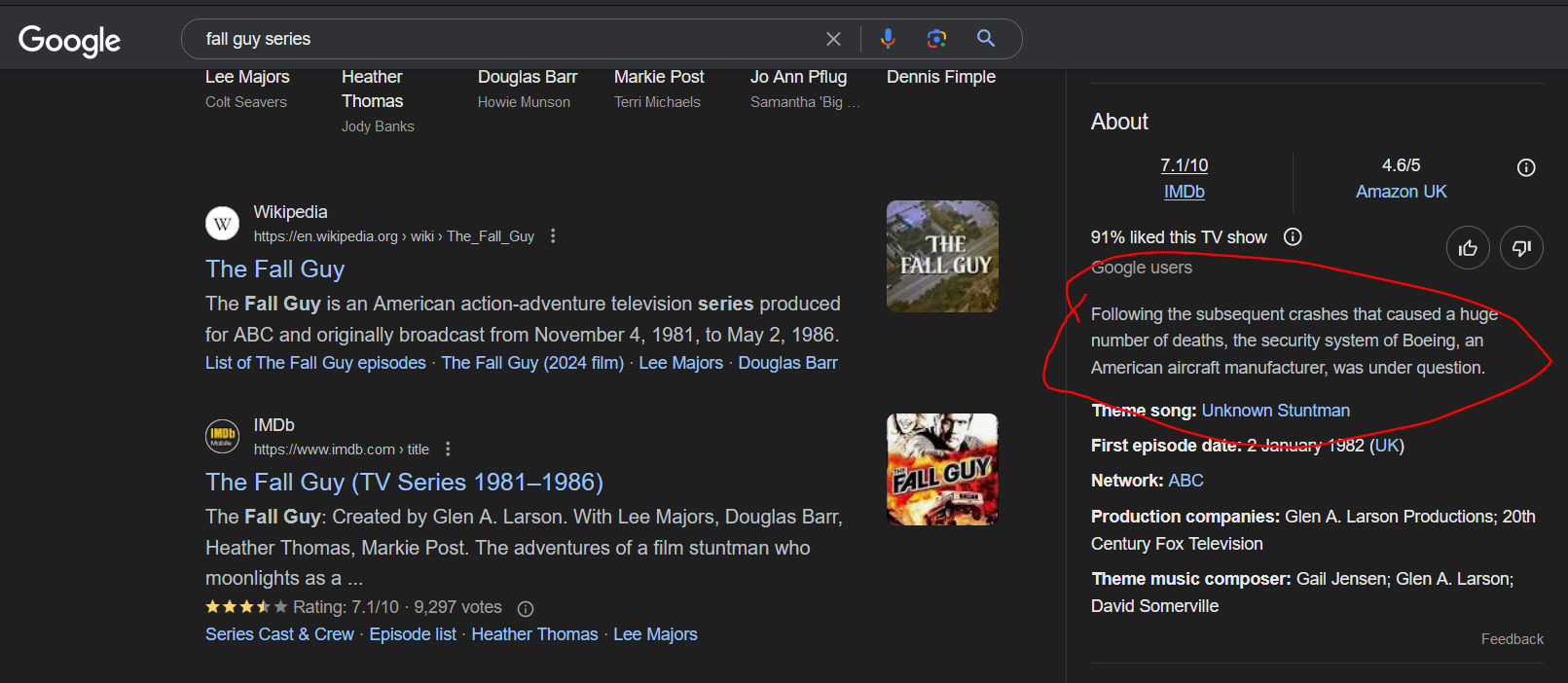Google has been bad for a long time, but they’ve shut the bed so hard lately. Seriously, look at this:

I actually run out of screenshot space before I can get to an actual regular search result!
deleted by creator
 Search done from Germany.
Search done from Germany.The mobile search doesnt look much different. The order on mobile is as follows:
- A snippet from glogs.wordlbank.org
- People also ask
- Forbes article (see screenshot above)
- www.epa.gov article
Both are Firefox Desktop (Win) and Mobile (Android) running Consent-O-Matic and ublock Origin
Similar results from Spain. Not sure why it thinks I’m in Michigan.

are you using a VPN? turned off location settings?
No and yes. Still not sure why such a random US state though
Well, Flint, Michigan had a high profile water issue, so it might be guessing location based on the question.
Unusable.
I kinda like the new google. It’s strong and wrong and doesn’t afraid of anything.
AI and its consequences have been a disaster for Google.
We really need a whole community just for the very funny AI errors like this. I could spend all day reading about leaving a dog in a hot car, jumping off a bridge and eating at least one rock a day.
So weird, that’s not what I see.
On the one hand, generative AI doesn’t have to give deterministic answers i.e. it won’t necessarily generate the same answer even when asked the same question in the same way.
But on the other hand, editing the HTML of any page to say whatever you want and then taking a screenshot of it is very easy.
It could also be A/B testing, so not everyone will have the AI running in general
It’s not A/B testing if they aren’t getting feedback.
Wouldn’t they be? They could measure how likely it is that someone clicks on the generated link/text
Just because you click on it that doesn’t make it accurate. More importantly, that text isn’t “clickable”, so they can’t be measuring raw engagement either.
Technically, generative AI will always give the same answer when given the same input. But, what happens is a “seed” is mixed in to help randomize things, that way it can give different answers every time even if you ask it the same question.
What happened to my computers being reliable, predictable, idempotent ? :'(
They still are. Giving a generative AI the same input and the same seed results in the same output every time.
Technically they still are, but since you don’t have a hand on the seed, practically they are not.
OK, but we’re discussing whether computers are “reliable, predictable, idempotent”. Statements like this about computers are generally made when discussing the internal workings of a computer among developers or at even lower levels among computer engineers and such.
This isn’t something you would say at a higher level for end-users because there are any number of reasons why an application can spit out different outputs even when seemingly given the “same input”.
And while I could point out that Llama.cpp is open source (so you could just go in and test this by forcing the same seed every time…) it doesn’t matter because your statement effectively boils down to something like this:
“I clicked the button (input) for the random number generator and got a different number (output) every time, thus computers are not reliable or predictable!”
If you wanted to make a better argument about computers not always being reliable/predictable, you’re better off pointing at how radiation can flip bits in our electronics (which is one reason why we have implemented checksums and other tools to verify that information hasn’t been altered over time or in transition). Take, for instance, the example of what happened to some voting machines in Belgium in 2003: https://www.businessinsider.com/cosmic-rays-harm-computers-smartphones-2019-7
Anyway, thanks if you read this far, I enjoy discussing things like this.
You are taking all my words way too strictly as to what I intended :)
It was more along the line : Me, a computer user, up until now, I could (more or less) expect the tool (software/website) I use in a relative consistant maner (be it reproducing a crash following some actions). Doing the same thing twice would (mostly) get me the same result/behaviour. For instance, an Excel feature applied on a given data should behave the same next time I show it to a friend. Or I found a result on Google by typing a given query, I hopefully will find that website again easily enough with that same query (even though it might have ranked up or down a little).
It’s not strictly “reliable, predictable, idempotent”, but consistent enough that people (users) will say it is.
But with those tools (ie: chatGPT), you get an answer, but are unable to get back that initial answer with the same initial query, and it basically makes it impossible to get that same* output because you have no hand on the seed.
The random generator is a bit streached, you expect it to be different, it’s by design. As a user, you expect the LLM to give you the correct answer, but it’s actually never the same* answer.
*and here I mean same as “it might be worded differently, but the meaning is close to similar as previous answer”. Just like if you ask a question twice to someone, he won’t use the exact same wording, but will essentially says the same thing. Which is something those tools (or rather “end users services”) do not give me. Which is what I wanted to point out in much fewer words :)
But the real question is, is the colour blue that you see, the colour blue that I see?
There for me

Yup me too 🫡
I spent most of today looking at places to rent in Denver and I come home to Google having killed it’s fucking search engine. What the hell is going on
That’s what you get for trying to have a real life.
Google decided that the entirety of reddit is perfect for training data in their AI LLM. People’s shitposts from 10 years ago have now been given the spotlight at the top of google searches.
What the hell is going on with Google search? Has it completely shit itself after the AI implementation? I know its been bad for a while but this is another level.
Short answer, yes. The ratio of LLM generated noise to actual content is increasing exponentially as we speak. To us it seems overnight because the increase is so steep but it’s been happening for several years. And it’s going to get a lot worse.
Honestly, I think we’ll have to go back to 90s methods like web rings and human curated link directories.









